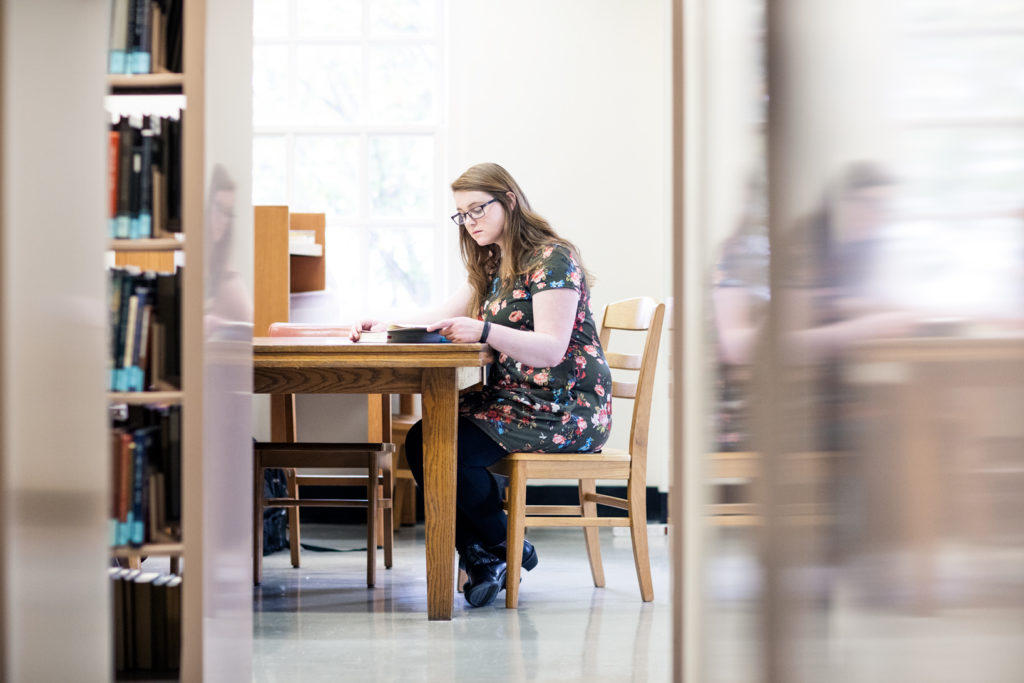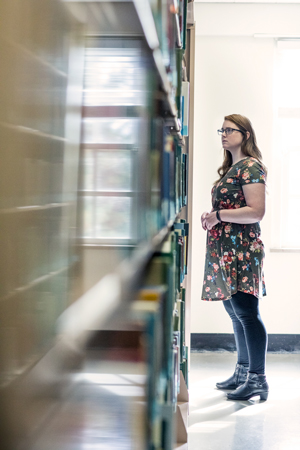When Kristen Wanamaker started at the Baptist College of Florida, she promised her pastor and herself one thing: She would never become Baptist.

Growing up in the Presbyterian Church of the United States of America (PCUSA), Wanamaker was baptized as a baby and became a believer at 14, but it wasn’t the custom in her church to make a public profession, so she never did.
In high school, she felt a call to ministry, and she’d heard that even if she attended the Baptist college, she wouldn’t be pressured into joining the denomination. She knew there were some differences in theology between Baptists and Presbyterians, but she hadn’t taken time to think through their significance.
But during her freshman year, she came to see that not everyone thought the same thing she did.
“I realized people have really strong opinions on baptism, on women in ministry, even on church structure,” she said. Wanamaker had never thought through why she was baptized as a baby. She’d never questioned the validity of the ordination of the woman who filled her pastor’s pulpit each time he was out of town. She didn’t give thought to the fact that her denomination was called Presbyterian because it had presbyteries. In short, she was a Presbyterian, but didn’t really know why.
For her, a new world was about to open. “I was thinking, ‘Nobody is going to change me. I’m not going to be that person who went away to a Baptist college and got sucked in,’” she said.
But, during that first year, she was enrolled in what she describes as the “trifecta” of classes: English, Spiritual Formation, and Baptist Heritage. In Spiritual Formation and Baptist Heritage, the topic of baptism was discussed at length. And she was genuinely confused.
“Through the course of the semester, I realized very quickly that my opinion on baptism was very misinformed,” she said. She sat down with her pastor, hoping he could explain why she was baptized as a baby. “And I was not satisfied with his answer.”
From the explanations in class, studying the Baptist Faith and Message, and reading Scripture for herself, she grew convinced that she was wrong. Yet, she pushed those thoughts aside, confident that her salvation wasn’t dependent on baptism. It wasn’t worth leaving the church she’d grown up in and breaking off theologically from her family.
 However, when she sat down to write a position paper for her English class, things changed. The topic she’d chosen for her position paper was women in ministry; she set out to argue in favor of the ordination of women.
However, when she sat down to write a position paper for her English class, things changed. The topic she’d chosen for her position paper was women in ministry; she set out to argue in favor of the ordination of women.
“I started working on an English paper, and it was hard to do. The more I researched, from my perspective, I started thinking, ‘I don’t know about this,’” she said. “I went into this thinking all of these Baptists just don’t like women. They don’t want us to be in ministry at all.”
But one resource, Two Views on Women in Ministry, was particularly troublesome. Specifically, Southern Seminary Thomas R. Schreiner’s contribution made Wanamaker uncomfortable.
“My attitude toward it was very bitter at first, but the more I wrote that paper, and the more I tried to argue for the position of the ordination of women, I realized I can’t justify this with Scripture. All of my arguments were based off feelings, not facts,” she said. Still, she continued to write her paper from the perspective that women could fill a lead pastoral role, on an as-needed basis.
“I went back and reread all of Dr. Schreiner’s arguments. I read pretty much everything that he wrote on the topic,” she recounted. And I realized, ‘This guy knows what he’s talking about.’”
She was thankful that one thing that was taught from the pulpit of her home church and within her home was that the Bible was always right. It had the ultimate authority.
Before she turned in the paper, she rewrote the entire thing.
“Women are a little hesitant to being told we can’t do certain things,” Wanamaker said. “But just because we’re hesitant doesn’t mean it’s not what Scripture says. Either I’m wrong or scripture is wrong, and Scripture is not wrong.”
Wanamaker decided she needed to follow what the Bible said, but before long she was not only convinced by the truthfulness of the Bible’s teaching, but began to take joy in it, she said.
By the end of that semester, she also became convinced that, although not part of her salvation, if she were being obedient to Christ’s commands, she must be biblically baptized. She worried how her family would react to her new convictions.
But God was gracious, she said, and as she made these decisions, her family was right beside her.
“On June 1, 2014, I’d finished my first year at the Baptist college I attended — where I said they wouldn’t make me a Baptist. My parents and my sister and I were all baptized together at First Baptist Church,” she shared. “It was hard to leave the church I grew up in, but it was the right decision.”
A couple years later, on a mission trip to Los Angeles, she became burdened with the lostness in North America. Not knowing exactly what that would look like, her heart surrendered to North American missions.
When she finally decided to look into seminary, she realized that there was one of the six Southern Baptist seminaries that offered a program dedicated to that very thing: Southern Seminary — the school where Schreiner teaches.
She stepped out of her car on Preview Day, and her heart was set. “It felt like home,” she recounts. Wanamaker is now in her fourth semester of her masters of divinity at Southern.
“It’s been everything I can imagine.”




